On August 20, 2025, a major medical event spanning the Eurasian continent and gathering top global expertise—the China-France Cancer Summit—was successfully held. The summit was co-hosted by China Anti-Cancer Association (CACA) and World Association for Integrative Oncology (WAIO). It attracted audiences from eight countries, including China, France, Belgium, Luxembourg, Italy, Spain, Canada, and Peru. The total number of online views exceeded 14.8 million, reflecting an unprecedented scale and demonstrating the global medical community’s high expectations for the latest advancements in cancer prevention and treatment in China and France.
The summit featured four distinguished leaders and renowned specialists in the field of oncology who delivered keynote reports. They were: Prof. Daiming Fan, President of CACA and WAIO; Prof. Florian Scotté, President of the Multinational Association of Supportive Care in Cancer (MASCC) and Director of Gustave Roussy Cancer Center in France; Prof. Jessica Zucman-Rossi, past President of International Liver Cancer Association and Director of Cordeliers Research Center; and Prof. Ningning Zhang, Director of Hepatobiliary Oncology Department at Tianjin Medical University Cancer Institute & Hospital and Vice Chair of the Integrative Organ Protection Committee of CACA. The summit was chaired by Prof. Jun Zhang, Chief Physician of Department of Oncology at Shanghai Ruijin Hospital and Chair of Neoplastic Oncology Supportive Care Committee of CACA. Prof. Ying Wang, Vice President of CACA, delivered the opening speech.
She first welcomed all the guests and emphasized the importance of international cooperation in addressing global cancer challenges. Prof. Wang noted that in recent years, CACA has achieved remarkable accomplishments in the field of cancer prevention and control—not only by continuously improving and promoting tumor diagnosis and treatment guidelines tailored to the Chinese population but also by actively building an international cooperation network. To date, 23 international summits have been held. Finally, Prof. Wang expressed her expectations for the outcomes of this China-France Summit and wished the conference complete success in gathering more wisdom and strength to advance global cancer prevention and treatment efforts.
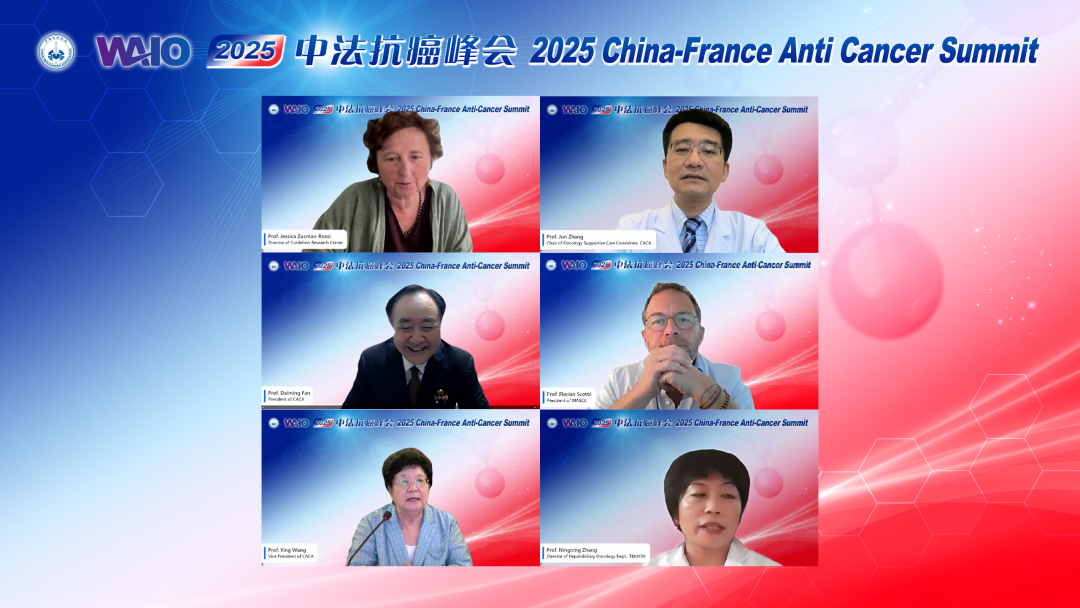
Releasing the China Solution, Sharing Integrative Wisdom
Prof. Fan, President of CACA and WAIO, delivered a keynote speech titled "Development of Holistic Integrative Management of Cancer in China." Prof. Fan provided an in-depth analysis of the unique challenges faced by China due to its large population base and complex evolving cancer spectrum. He systematically reviewed CACA’s explorations and practices in promoting the implementation of the Holistic Integrative Management (HIM) concept and introduced the "Chinese Guidelines for Holistic Integrative Diagnosis and Treatment of Cancer (CACA Guidelines)" at the summit. He proposed the concept of whole-process management encompassing "Prevention-Screening-Diagnosis-Treatment-Rehabilitation" and innovatively put forward the "Evaluation-Support-Control-Protection-Survival" approach, reflecting China’s unique diagnosis, treatment, and management experience. This systematic "Chinese Solution" provides valuable theoretical support and actionable practical pathways for building localized, high-efficiency cancer prevention and control systems globally, especially in developing countries.
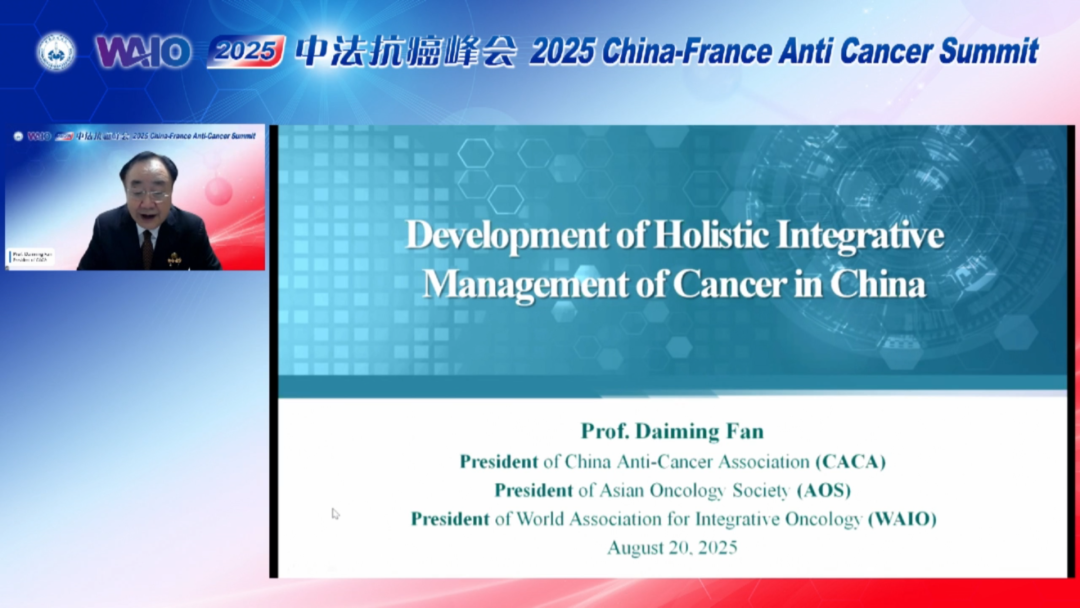
Focusing on Supportive Care, Improving Quality of Life
Prof. Florian Scotté, President of MASCC, Vice President of AFSOS, and Director of Gustave Roussy Cancer Center in France, delivered a keynote speech on "Latest Updates of Supportive Care." Prof. Scotté focused on cutting-edge developments in supportive care, sharing research on new technologies and drugs, such as low-dose olanzapine for preventing radiotherapy-induced nausea and vomiting, the new drug Elinzanetant for effectively reducing hot flashes in breast cancer patients undergoing hormone therapy, and the significant effects of electro-acupuncture in alleviating symptoms in breast cancer survivors. These advancements provide cancer patients with more comprehensive and personalized treatment options. Finally, Prof. Scotté also looked ahead to the "Supportive Care 2030" initiative, calling for multidisciplinary collaboration to comprehensively enhance the level of oncology supportive care and truly realize the vision of "making quality cancer care possible."
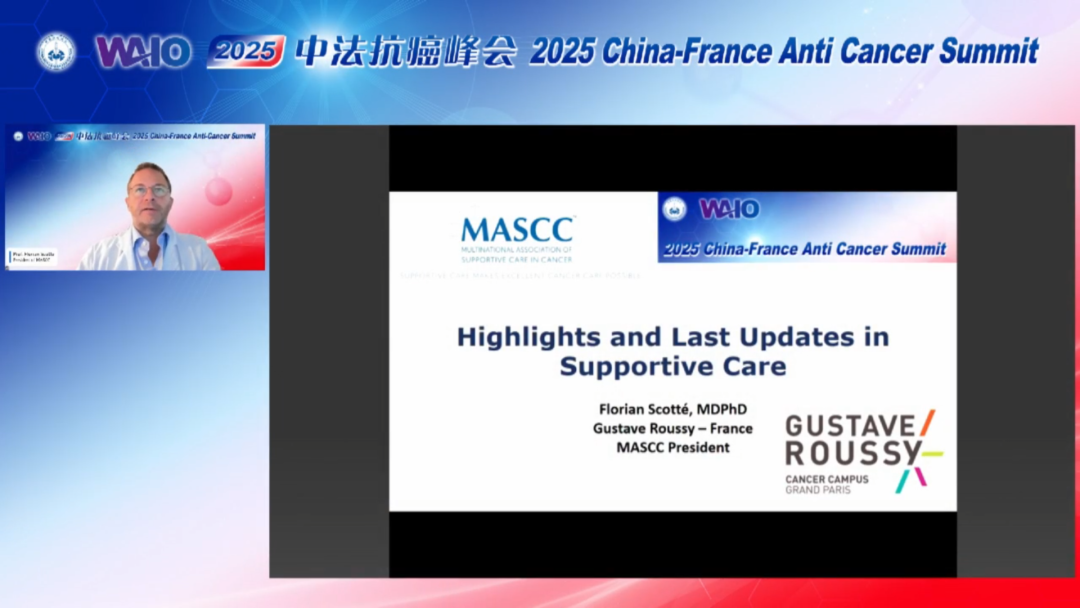
Tracing the Causes of Liver Cancer, Exploring New Prevention Strategies
Prof. Jessica Zucman-Rossi, Director of Cordeliers Research Center and former President of International Liver Cancer Association, shared her insights on "How Does Environmental Exposure Modulate Liver Carcinogenesis?" Prof. Zucman-Rossi pointed out that the incidence and mortality rates of liver cancer are expected to rise significantly worldwide, particularly in Asia. Environmental exposures, such as aflatoxin, hepatitis B virus, alcohol, and metabolic factors like obesity, are closely related to liver cancer development, with over 60% of liver cancer cases preventable by reducing environmental exposures. Prof. Zucman-Rossi systematically analyzed the complex interactions between environmental exposures and genetic background in liver cancer development, emphasized the role of genetic factors in liver cancer pathogenesis, and called for integrating multidisciplinary approaches to develop personalized prevention and treatment strategies.
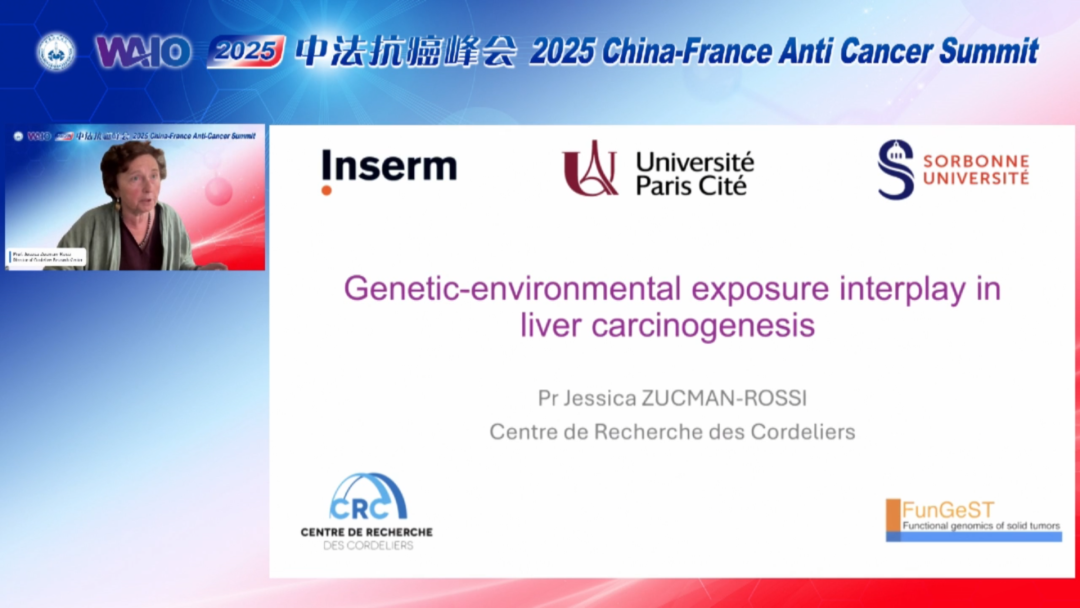
Optimizing Clinical Strategies, Achieving Personalized Treatment
Prof. Ningning Zhang, Director of Hepatobiliary Oncology Department at Tianjin Medical University Cancer Institute & Hospital and Vice Chairman of the Integrative Organ Protection Committee of CACA, addressed the topic of "Personalized Optimization Strategies for First-line Treatment of Intermediate-to-Advanced Hepatocellular Carcinoma." Based on the Holistic Integrative Oncology concept advocated by Prof. Fan, Prof. Zhang systematically elaborated on the current status of personalized treatment for mid-to-late-stage liver cancer domestically and internationally. She shared evidence from multicenter clinical studies on the efficacy and safety of TACE combined with targeted immunotherapy as a first-line treatment for mid-to-late-stage liver cancer. Additionally, Prof. Zhang emphasized the necessity of managing liver cancer patients with portal hypertension and shared her team’s achievements in multi-omics research on liver cancer. By focusing on mechanisms of drug resistance and targets for enhancing immunotherapy efficacy, her team is committed to building a personalized whole-process management paradigm for liver cancer with Chinese characteristics.
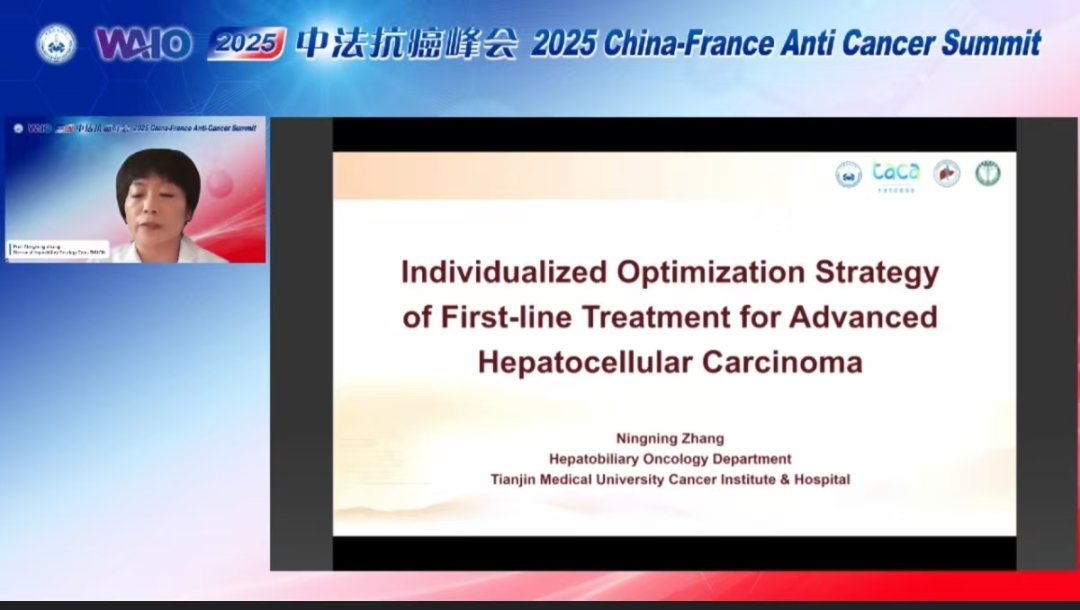
Discussing New Paths for International Influence, Integrating Chinese and Western Approaches to Lead the Future of Cancer Prevention and Treatment
During the round-table discussion, in response to Prof. Zhang’s question on "how to enhance the global influence of academic institutions," Prof. Fan and Prof. Scotté, as presidents of international cancer associations, shared valuable insights. Prof. Fan pointed out that China should develop guidelines with local characteristics, integrate the advantages of Chinese and Western medicine, and comprehensively focus on cancer prevention, rehabilitation, and patient quality of life. He advocated for international cooperation to achieve complements between Chinese and Western guidelines and jointly promote the improvement of global cancer diagnosis and treatment standards. Prof. Scotté believed that promoting supportive care, building bridges between doctors and patients, developing international guidelines, and facilitating academic exchanges are crucial. He highly praised Prof. Fan’s leadership of CACA in promoting the construction of cross-cultural, cross-regional medical consensus—not only by compiling and widely promoting the CACA Guidelines but also by gathering global wisdom and collaborating with top scholars from multiple countries to create high-level international academic exchange platforms. The perspectives of the two experts provided new ideas for academic institutions to enhance their international influence.

The China-France Cancer Summit was not only a concentrated showcase of academic achievements but also a successful convergence of ideas and strategic synergies. The summit successfully established a high-end platform for the integration and mutual learning of Eastern and Western medical wisdom, deepened strategic cooperation between China and France in the healthcare field, and injected new vitality and forward-thinking momentum into global cancer prevention and control efforts.
|